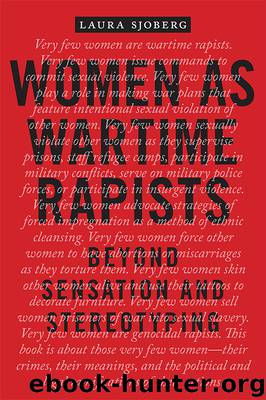Women as Wartime Rapists by Sjoberg Laura;

Author:Sjoberg, Laura;
Language: eng
Format: epub
Tags: POL061000 Political Science / Genocide & War Crimes
Publisher: NYU Press
Problematizing “Gender Justice”
These problems with the politics, meaning-creation, and violence of international criminal trials for sexual violence in war and conflict stem from what I argue are misunderstandings of gender, of perpetration, and of victimization in much “gender justice” thinking about conflict sexual violence jurisprudence. These misunderstandings then spill over into and feed off of the jurisprudence itself.
The problematic understanding of gender underlying most of this thinking, is that “gender justice” often means “justice for women as they are positioned relative to men.” While this is an important part of gender justice, reducing gender justice to women’s justice vis-à-vis men has the ironic impact of dampening the potential for the achievement of either gender justice more broadly or justice for women specifically. This is because the victimization of women in sexual violence in war and conflict is not the victimization of women as women by men as men—it is instead the victimization of women (and some men and some people that are both/and or neither/nor) as associated with and signified as related to femininity by men (and women and some people that are both/and or neither/nor) interested in asserting (literal or figurative) masculine dominance.73 Understanding this means that seeking protection of women as women from men as men is an incorrectly specified object in the “gender justice” paradigm, which can be a problem for its applicability to the gendered complexities of sexual violence in war and conflict, even when it is committed by those generally understood to be men against those generally understood to be women.
Recalibrating this reading of gender might reformulate traditional claims about the need for gender justice in jurisprudence. For example, as Doris Buss explains, following the post–Cold War conflict in the former Yugoslavia, “violence against women, including in conflict settings, and the erasure of women’s experiences by international institutions and actors, quickly became a defining issue for activists and scholars.”74 I am not arguing that violence against women and the erasure of women’s experiences by international institutions and actors are not important problems around which activism should be centered. Instead, I am arguing that activism centered around violence against women and the erasure of women’s experiences should be aimed at the axes of gender subordination that associate women with femininities and devalue femininities.
When I argue that the gender justice paradigm holds a partial understanding of the phenomenon of perpetration, I mean to invoke my earlier discussion of relational autonomy and gendered practice. The gender justice paradigm more often than not focuses on rape as a choice made by its perpetrators, and then analyzes the motivations for and impacts of that choice. For example, common soundbite analyses of sexual violence in war and conflict suggest that “rape is about power, not about sex.”75 In this interpretation, the gender subordination in sexual violence in war and conflict is in the expression of men’s power over women. That view, however, is oversimplified—if rape were solely about power rather than about sex, then “why don’t men just hit women?”76 In other words, there is a sexual component to the perpetration of sexual violence in war and conflict.
Download
This site does not store any files on its server. We only index and link to content provided by other sites. Please contact the content providers to delete copyright contents if any and email us, we'll remove relevant links or contents immediately.
The Rule of Law by Bingham Tom(1315)
The Holocaust: A New History by Laurence Rees(1231)
Political Theology by Carl Schmitt(1184)
Restitution by Restitution(1111)
Pirates of Somalia by Jay Bahadur(1111)
The Social Animal by David Brooks(1111)
A Practical Guide to International Arbitration in London by Hilary Heilbron(1077)
Coercing Virtue by Robert H. Bork(1021)
The Nuremberg Interviews by Leon Goldensohn(983)
Basic International Corporate Taxation by Sebastiano Garufi(923)
A History Of Thailand by Baker Chris(885)
Asian Waters by Humphrey Hawksley(875)
International Trade and Business: Law, Policy and Ethics by Gabriël Moens & Peter Gillies(865)
Blood Profits by Vanessa Neumann(865)
Spring Fever: The Illusion of Islamic Democracy by McCarthy Andrew C(864)
The Global Commons by Susan J. Buck(860)
Crimes Against Humanity: Historical Evolution and Contemporary Application by M. Cherif Bassiouni(792)
The Sovereignty of Human Rights by Macklem Patrick(788)
The Nuremberg Trials: The Nazis and their Crimes Against Humanity by Roland Paul(787)
